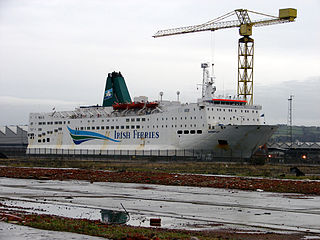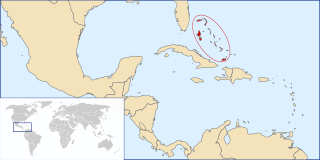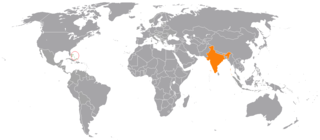
The Bahamas, known officially as the Commonwealth of The Bahamas, is a country within the Lucayan Archipelago of the West Indies in the Atlantic. It takes up 97% of the Lucayan Archipelago's land area and is home to 88% of the archipelago's population. The archipelagic state consists of more than 700 islands, cays, and islets in the Atlantic Ocean, and is located north of Cuba and northwest of the island of Hispaniola and the Turks and Caicos Islands, southeast of the US state of Florida, and east of the Florida Keys. The capital is Nassau on the island of New Providence. The Royal Bahamas Defence Force describes The Bahamas' territory as encompassing 470,000 km2 (180,000 sq mi) of ocean space.

Nassau is the capital and largest city of the Bahamas. With a population of 274,400 as of 2016, or just over 70% of the entire population of the Bahamas (≈391,000), Nassau is commonly defined as a primate city, dwarfing all other towns in the country. It is the centre of commerce, education, law, administration, and media of the country.
Wrecking is the practice of taking valuables from a shipwreck which has foundered or run aground close to shore. Often an unregulated activity of opportunity in coastal communities, wrecking has been subjected to increasing regulation and evolved into what is now known as marine salvage.

The earliest arrival of people in the islands now known as The Bahamas was in the first millennium AD. The first inhabitants of the islands were the Lucayans, an Arawakan-speaking Taino people, who arrived between about 500 and 800 AD from other islands of the Caribbean.

New Providence is the most populous island in The Bahamas, containing more than 70% of the total population. It is the location of the national capital city of Nassau, whose boundaries are coincident with the island; it had a population of 246,329 at the 2010 Census; the latest estimate (2016) is 274,400. The island was originally under Spanish control following Christopher Columbus's discovery of the New World, but the Spanish government showed little interest in developing the island. Nassau, the island's largest city, was formerly known as Charles-town, but it was burned to the ground by the Spanish in 1684. It was laid out and renamed Nassau in 1695 by Nicholas Trott, the most successful Lord Proprietor, in honour of the Prince of Orange-Nassau who became William III of England. The three branches of Bahamian Government: the executive, the legislative, and the judiciary, are all headquartered on New Providence. New Providence functions as the main commercial hub of The Bahamas. It is also home to more than 400 banks and trust companies, and its hotels and port account for more than two-thirds of the four million-plus tourists who visit The Bahamas annually. Other settlements on New Providence include Grants Town, Bain Town, Fox Hill, Adelaide, Yamacraw, South Beach, Coral Harbour, Lyford Cay, Paradise Island, Sea Breeze, Centreville, The Grove (South) and The Grove, Cable Beach, Delaporte, Gambier, Old Fort Bay, Carmichael Road, and Love Beach.

Flag of convenience (FOC) is a business practice whereby a ship's owners register a merchant ship in a ship register of a country other than that of the ship's owners, and the ship flies the civil ensign of that country, called the flag state. The term is often used pejoratively, and although common, the practice is sometimes regarded as contentious. Each merchant ship is required by international law to be registered in a registry created by a country, and a ship is subject to the laws of that country, which are used also if the ship is involved in a case under admiralty law. A ship's owners may elect to register a ship in a foreign country which enables it to avoid the regulations of the owners' country which may, for example, have stricter safety standards. They may also select a jurisdiction to reduce operating costs, avoiding higher taxes in the owners' country and bypassing laws that protect the wages and working conditions of mariners. The term "flag of convenience" has been used since the 1950s. A registry which does not have a nationality or residency requirement for ship registration is often described as an open registry. Panama, for example, offers the advantages of easier registration and the ability to employ cheaper foreign labour. Furthermore, the foreign owners pay no income taxes.

The national flag of the Commonwealth of The Bahamas consists of a black triangle situated at the hoist with three horizontal bands: aquamarine, gold and aquamarine. Adopted in 1973 to replace the British Blue Ensign defaced with the emblem of the Crown Colony of the Bahama Islands, it has been the flag of the The Bahamas since the country gained independence that year. The design of the present flag incorporated the elements of various submissions made in a national contest for a new flag prior to independence.

Andros Island is an archipelago within the Bahamas, the largest of the Bahamian Islands. Politically considered a single island, Andros in total has an area greater than all the other 700 Bahamian islands combined. The land area of Andros consists of hundreds of small islets and cays connected by mangrove estuaries and tidal swamplands, together with three major islands: North Andros, Mangrove Cay, and South Andros. The three main islands are separated by "bights", estuaries that trifurcate the island, connecting the island's east and west coasts. It is 167 kilometres (104 mi) long by 64 km (40 mi) wide at the widest point.

MS Normandy was a ferry, last owned by the Singapore-based oil service company Equinox Offshore Accommodation, under charter the Morocco-based ferry operator Ferrimaroc. She was built in 1981 by Götaverken, Gothenburg, Sweden, and first entered service in 1982 as MS Prinsessan Birgitta for Stena Sessan Line. She also served under the names MS St Nicholas and MS Stena Normandy.

The following is an alphabetical list of topics related to the Commonwealth of The Bahamas.

MV Prestige was an oil tanker owned by a Greek company based in Athens and operating under a Bahamian flag, that on 19 November 2002 sank off the coast of Galicia, Spain. The sinking caused a major environmental disaster, polluting thousands of miles of coastline with 50,000 tonnes of oil.
Afro-Bahamians are an ethnicity originating in The Bahamas of predominantly or partial African descent. They are descendants of various African ethnic groups, many associated with the empires of Ghana, Songhai and Mali, the various Fula kingdoms, the Oyo Empire, and the Kingdom of Kongo. According to the 2010 Census, 92.7% of The Bahamas' population identifies as Black African descent.

The 1866 Atlantic hurricane season was originally one of only four Atlantic hurricane seasons in which every known tropical cyclone attained hurricane status, along with 1852, 1858, and 1884. Initially, there were three known storms during the season, but a re-analysis confirmed the increased activity. There were also two other systems that were included as tropical cyclones at one time, although both were considered to have been other storms already in the database. All tropical activity occurred between the middle of July and the end of October. There may have been additional unconfirmed tropical cyclones during the season. Meteorologist Christopher Landsea estimates that up to six storms were missed from the official database, due to small tropical cyclone size, sparse ship reports, and relatively unpopulated coastlines.

SS Ithaka was a small freighter, originally built as Frank A. Augsbury for the Canadian George Hall Coal & Shipping Corporation in 1922. She went on to sail for a variety of different owners, and was renamed Granby in 1927, Parita II in 1948, Valbruna in 1951, Lawrencecliffe Hall in 1952, Federal Explorer in 1955 and finally Ithaka in 1960, before being wrecked on the Canadian coast later that year.

Speedlink Vanguard was a 3,514 GRT train ferry which was built in 1973 as Stena Shipper. She was charted to a New Zealand operator on completion and renamed Union Wellington and saw further service as Alpha Express and Stena Shipper before entering service with Sealink as Speedlink Vanguard. The ship was involved in a collision with European Gateway in 1982, which sank the latter ship with the loss of six lives.

Eastern Steamship Lines was a shipping company in the United States that operated from 1901 to 1955. It was created through successive mergers by Wall Street financier and speculator Charles Wyman Morse. The line sailed along the eastern seaboard of the United States and Canada, operating out of Boston and New York.

The Bahamas, officially the Commonwealth of The Bahamas, competed at the 2016 Summer Olympics in Rio de Janeiro, Brazil, from 5 to 21 August 2016. The nation's participation at these Games marked its seventeenth appearance as an independent nation.

The Bahamas–India relations refers to the international relations that exist between The Bahamas and India. The Bahamas maintains an Honorary Consulate in New Delhi. The High Commission of India in Kingston, Jamaica concurrently accredited to The Bahamas. India does not have a resident diplomatic mission in The Bahamas.
Bahamian nationality law is regulated by the 1973 Constitution of the Commonwealth of The Bahamas, as amended; The Bahamas Nationality Act; The Bahamas Immigration Act; and various British Nationality laws. These laws determine who is, or is eligible to be, a national of The Bahamas. Bahamian nationality is typically obtained either on the principle of jus soli, i.e. by birth in The Bahamas; or under the rules of jus sanguinis, i.e. by birth abroad to a father with Bahamian nationality. It can also be granted to persons with an affiliation to the country, or to a permanent resident who has lived in the country for a given period of time through naturalisation. There is currently no program in The Bahamas for citizenship by investment. Nationality establishes one's international identity as a member of a sovereign nation. Though it is not synonymous with citizenship, rights granted under domestic law for domestic purposes, the United Kingdom, and thus the commonwealth, has traditionally used the words interchangeably.













